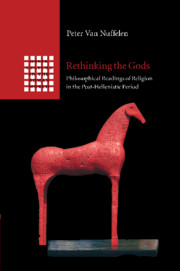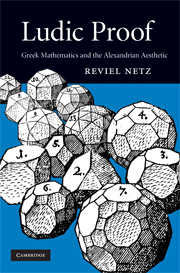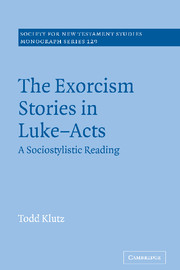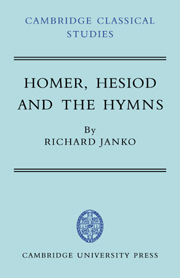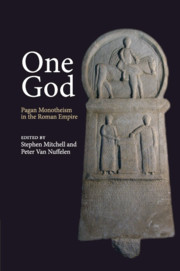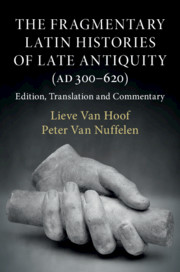Rethinking the Gods
Philosophical Readings of Religion in the Post-Hellenistic Period
$41.99 ( ) USD
Part of Greek Culture in the Roman World
- Author: Peter van Nuffelen, Universiteit Gent, Belgium
- Date Published: March 2012
- availability: This ISBN is for an eBook version which is distributed on our behalf by a third party.
- format: Adobe eBook Reader
- isbn: 9781139181204
Find out more about Cambridge eBooks
$
41.99 USD
( )
Adobe eBook Reader
Other available formats:
Hardback, Paperback
Looking for an examination copy?
If you are interested in the title for your course we can consider offering an examination copy. To register your interest please contact [email protected] providing details of the course you are teaching.
-
Ancient philosophers had always been fascinated by religion. From the first century BC onwards, the traditionally more hostile attitude of Greek and Roman philosophy was abandoned in favour of the view that religion was a source of philosophical knowledge. This book studies that change, not from the perspective of the history of religion, as is usual, but understands it as part of the wider tendency of Post-Hellenistic philosophy to open up to external, non-philosophical sources of knowledge and authority. It situates two key themes, ancient wisdom and cosmic hierarchy, in the context of Post-Hellenistic philosophy and traces their reconfigurations in contemporary literature and in the polemic between Jews, Christians and pagans. Overall, Post-Hellenistic philosophy can be seen to have a relatively high degree of unity in its ideas on religion, which should not be reduced to a preparation for Neo-Platonism.
Read more- Proposes a new understanding of how philosophy relates to religion in the Roman Empire
- Integrates the study of philosophy and literature and shows the benefits of such an approach
- Provides ancient parallels for modern religious legitimisation of power
Reviews & endorsements
"Reading this very exciting, independent and wide-ranging contribution to the debate about the relationship between religion and philosophy in the early imperial period calls out with a variety of new impulses in different directions and is highly recommended reading."
BMCRSee more reviews"… [Nuffelen] has provided us here with a most stimulating, well-researched and well-argued monograph on a complex of topics central to the intellectual concerns of a wide range of thinkers in the first two centuries of the Common Era."
LiteraturkritikCustomer reviews
Not yet reviewed
Be the first to review
Review was not posted due to profanity
×Product details
- Date Published: March 2012
- format: Adobe eBook Reader
- isbn: 9781139181204
- availability: This ISBN is for an eBook version which is distributed on our behalf by a third party.
Table of Contents
Introduction
Part I. Ancient Wisdom:
1. Tracing the origins: ancients, philosophers, and mystery cults
2. Plutarch of Chaeronea: 'History as a basis for a philosophy that has theology as its end'
3. Numenius: philosophy as a hidden mystery
4. Dio Chrysostom, Apuleius and the rhetoric of ancient wisdom
Part II. Cosmic Hierarchy:
5. Towards the pantheon as the paradigm of order
6. The Great King of Persia and his satraps: ideal and ideology
7. Dio Chrysostom: virtue and structure in the Kingship Orations
8. Plutarch: a benevolent hierarchy of gods and men
Part III. Polemic and Prejudice: Challenging the Discourse:
9. Lucian, Epicureanism and strategies of satire
10. Philo of Alexandria: challenging Greco-Roman culture
11. Celsus and Christian superstition
Epilogue.
Sorry, this resource is locked
Please register or sign in to request access. If you are having problems accessing these resources please email [email protected]
Register Sign in» Proceed
You are now leaving the Cambridge University Press website. Your eBook purchase and download will be completed by our partner www.ebooks.com. Please see the permission section of the www.ebooks.com catalogue page for details of the print & copy limits on our eBooks.
Continue ×Are you sure you want to delete your account?
This cannot be undone.
Thank you for your feedback which will help us improve our service.
If you requested a response, we will make sure to get back to you shortly.
×
